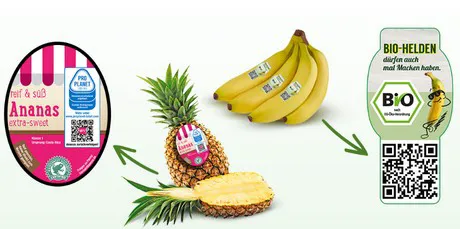According to an EFSA study published in June of this year, 53 percent of EU citizens surveyed say the issue of where their food comes from is a relevant purchasing criterion. The origin is therefore more important than costs (51%), food safety (50%) or their taste preference (49%).
PENNY recognized this trend at an early stage and is gradually introducing more extensive product and source information, especially for its own brands. From Monday 19-08-2019, all pineapples will be provided with a QR code. For these, customers can access a special website. There they will find detailed information about the respective plantation as well as its sustainability activities, audits or awards. In September (from 09-09 onwards) the Naturgut organic bananas will also appear with a corresponding QR code.

For example, PENNY customers can read that pineapple supplier Tropicales del Valle of San Carlos, Costa Rica, is a family business. The finca is located in the province of Alajuela, where mainly pineapple, but also sugar cane and coffee is being grown. The plant, which sold around 3.5 million boxes of pineapple last year, employs 364 people, 60 of whom are women. The company is certified Rainforest Alliance, GLOBAL G.A.P and GRASP. In addition, PENNY customers can find out in words and pictures that Tropicales del Valle has voluntarily protected 150,000 square meters of rainforest on the estate. In addition, the website provides general information on the sustainability commitment of PENNY (including REWE Group Central America Fund).
Ecological responsibility in the supply chain
"Our customers should be able to trust us and our products. With the introduction of the QR code we show that we are aware of our social and environmental responsibility in the supply chain. Customers who buy pineapples and bananas from us can do so with confidence and with a clear conscience because we place great value on the selection of our partners. In doing so, we also look at its environmental and social stance," said Stefan Magel, Divisional Board Member for Retail Trade REWE Group and COO PENNY.
For more informationen: www.rewe-group.com/de
